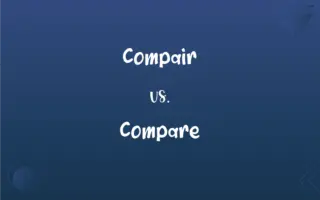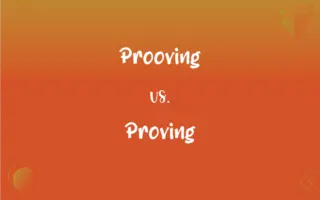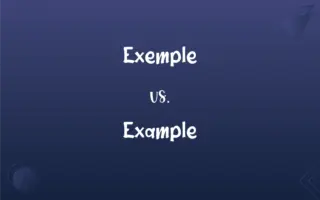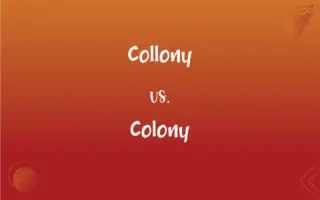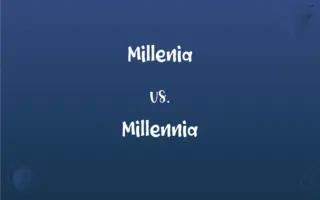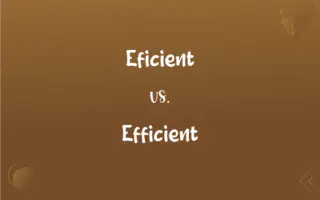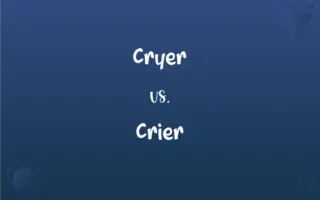Absorbant vs. Absorbent: Mastering the Correct Spelling
Edited by Harlon Moss || By Janet White || Updated on March 13, 2024
"Absorbant" is an incorrect spelling. The correct spelling is "Absorbent," which refers to something that can soak up or absorb liquids effectively.

Which is correct: Absorbant or Absorbent
How to spell Absorbent?

Absorbant is Incorrect

Absorbent is Correct
ADVERTISEMENT
Key Differences
Think: "An absorbENT entity absorbs."
Use mnemonics: "Be consistENT with 'ENT' in absorbent."
Recall similar words like "persistent" and "absorbent" both ending in "ent."
"Ant" is an insect, whereas "ent" can absorb.
Remember the root "absorb" which ends with "b," followed by "ent."
ADVERTISEMENT
Correct usage of Absorbent
She bought an absorbant mat for the bathroom.
She bought an absorbent mat for the bathroom.
We need an absorbant sponge to clean up the spill.
We need an absorbent sponge to clean up the spill.
The soil in this pot is not very absorbant.
The soil in this pot is not very absorbent.
This material is not absorbant enough for our needs.
This material is not absorbent enough for our needs.
The towel is very absorbant and can dry dishes quickly.
The towel is very absorbent and can dry dishes quickly.
Absorbent Definitions
Able to assimilate information or ideas.
Young minds are especially absorbent.
Engaging or engrossing one's attention.
The absorbent novel kept her reading for hours.
A material that absorbs or takes in moisture.
Cotton is a natural absorbent.
Capable of soaking up liquids.
The towel is highly absorbent.
Taking in and holding energy, such as sound or light.
Certain materials are absorbent to sound waves.
Capable of absorbing a liquid or gas
Absorbent cotton.
A substance that is capable of absorbing.
Having the ability or tendency to absorb; able to soak up liquid easily; absorptive.
Those paper towels were amazingly absorbent. That was quite a spill.
Anything which absorbs.
The vessels by which the processes of absorption are carried on, as the lymphatics in animals, the extremities of the roots in plants.
(medicine) Any substance which absorbs and neutralizes acid fluid in the stomach and bowels, as magnesia, chalk, etc.; also a substance, e.g., iodine, which acts on the absorbent vessels so as to reduce enlarged and indurated parts.
(chemistry) A liquid used in the process of separating gases or volatile liquids, in oil refining.
Absorbing; swallowing; absorptive.
Any substance which absorbs and neutralizes acid fluid in the stomach and bowels, as magnesia, chalk, etc.; also a substance e. g., iodine) which acts on the absorbent vessels so as to reduce enlarged and indurated parts.
A material having capacity or tendency to absorb another substance
Having power or capacity or tendency to absorb or soak up (liquids);
As absorbent as a sponge
Absorbent Sentences
The plant's roots are in need of highly absorbent soil to thrive.
Diapers are made from specially designed absorbent materials.
Using an absorbent cloth helps in quickly drying off cars after a wash.
The absorbent nature of the sponge makes it ideal for mopping floors.
She prefers using absorbent paper towels for cleaning kitchen counters.
He chose an absorbent coaster to prevent rings on the wooden table.
Absorbent towels are a must-have in any kitchen.
Absorbent mats are placed under machines to catch any leaks.
Using an absorbent pad under the dish rack prevents water from pooling on the counter.
The absorbent properties of the foam make it ideal for soundproofing rooms.
The new absorbent technology can hold up to three times its weight in water.
The absorbent lining in the helmet helps wick away sweat.
They added an absorbent layer to the packaging to protect against moisture.
The company developed an absorbent compound to deal with hazardous spills.
Absorbent cotton is used for medical purposes because it soaks up fluids well.
The absorbent barrier was placed around the spill to prevent it from spreading.
Finding an absorbent yet breathable fabric is key for summer clothing.
The rug's absorbent quality keeps the room dry even in wet weather.
Absorbent beads are used in gardening to help retain water in the soil.
The new makeup remover is made of an absorbent material that requires no cleanser.
He wears an absorbent headband when running to keep sweat out of his eyes.
Absorbent clay is often used in cat litter for its moisture-locking capabilities.
FAQs
What is the root word of Absorbent?
The root word is "absorb."
What is the verb form of Absorbent?
The verb form related to "Absorbent" is "absorb."
What is the plural form of Absorbent?
The plural form is "absorbents."
Which conjunction is used with Absorbent?
Any conjunction can be used with "Absorbent" depending on the sentence structure.
What is the pronunciation of Absorbent?
Absorbent is pronounced as /əbˈsɔːrbənt/.
Which preposition is used with Absorbent?
"Of" is commonly used, as in "absorbent of liquids."
Is Absorbent a noun or adjective?
"Absorbent" can be both a noun and an adjective.
Why is it called Absorbent?
It's called "Absorbent" because it pertains to the ability to "absorb" or soak up substances.
What is the singular form of Absorbent?
"Absorbent" itself is singular.
Which vowel is used before Absorbent?
The vowel "an" is commonly used before "Absorbent," as in "an absorbent material."
Is Absorbent an adverb?
No, "Absorbent" is not an adverb.
Is Absorbent a collective noun?
No, "Absorbent" is not a collective noun.
Is the word Absorbent imperative?
No, "Absorbent" is not imperative.
Is Absorbent a negative or positive word?
"Absorbent" is a neutral word, but often has a positive connotation in contexts where absorption is desired.
What part of speech is Absorbent?
"Absorbent" can be both an adjective and a noun.
What is another term for Absorbent?
Another term for "Absorbent" is "spongy."
Which article is used with Absorbent?
Both "a" and "an" can be used depending on the context. Typically, "an" is used, as in "an absorbent sponge."
Is Absorbent a vowel or consonant?
"Absorbent" is a word and contains both vowels and consonants.
Is the Absorbent term a metaphor?
No, "Absorbent" is not typically used as a metaphor.
How do we divide Absorbent into syllables?
Ab-sorb-ent.
Which determiner is used with Absorbent?
Determiners like "this," "that," "these," and "those" can be used depending on the context.
What is the first form of Absorbent?
"Absorbent" doesn't have verb forms. However, related to the root verb "absorb," the first form is "absorb."
What is the second form of Absorbent?
Related to the verb "absorb," the second form is "absorbed."
What is a stressed syllable in Absorbent?
The second syllable "sorb" is stressed in "Absorbent."
How is Absorbent used in a sentence?
"The absorbent fabric quickly dried up the spilled water."
How many syllables are in Absorbent?
There are three syllables in "Absorbent."
What is the third form of Absorbent?
Related to the verb "absorb," the third form is also "absorbed."
Is Absorbent an abstract noun?
No, "Absorbent" is not an abstract noun.
Is Absorbent a countable noun?
As a noun, "Absorbent" can be countable, e.g., "There are several absorbents available in the market."
What is the opposite of Absorbent?
The opposite of "Absorbent" is "repellent" or "non-absorbent."
About Author
Written by
Janet WhiteJanet White has been an esteemed writer and blogger for Difference Wiki. Holding a Master's degree in Science and Medical Journalism from the prestigious Boston University, she has consistently demonstrated her expertise and passion for her field. When she's not immersed in her work, Janet relishes her time exercising, delving into a good book, and cherishing moments with friends and family.
Edited by
Harlon MossHarlon is a seasoned quality moderator and accomplished content writer for Difference Wiki. An alumnus of the prestigious University of California, he earned his degree in Computer Science. Leveraging his academic background, Harlon brings a meticulous and informed perspective to his work, ensuring content accuracy and excellence.





